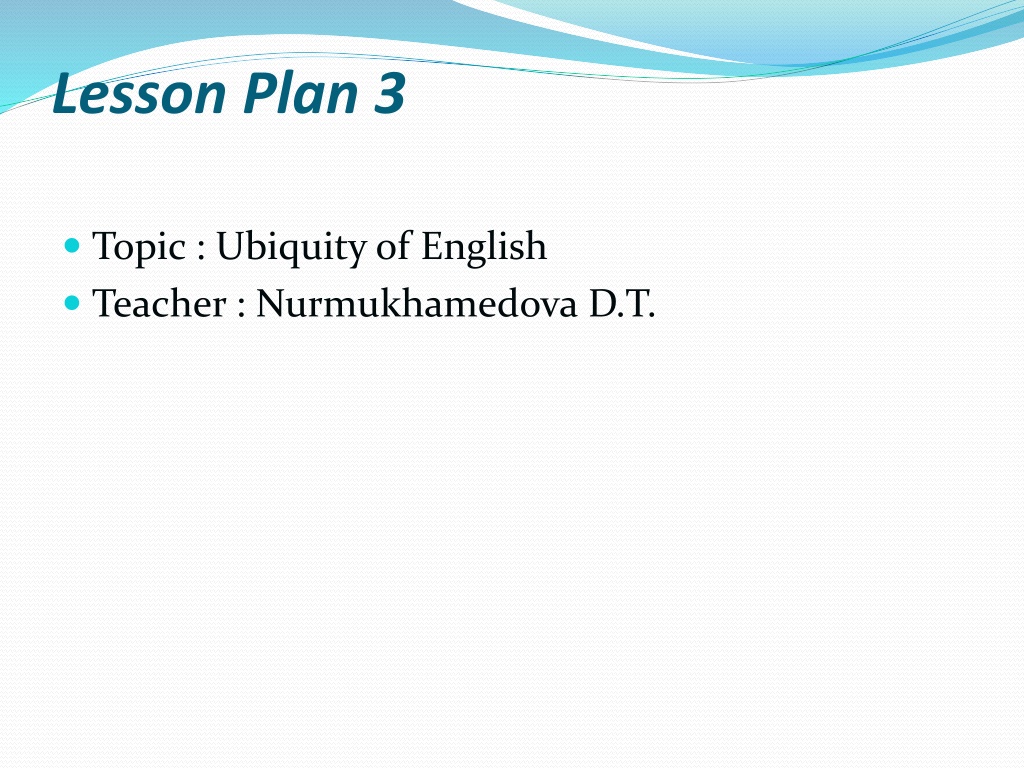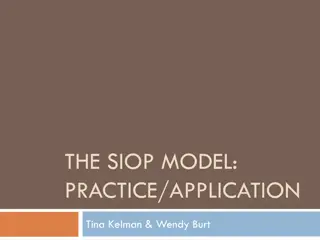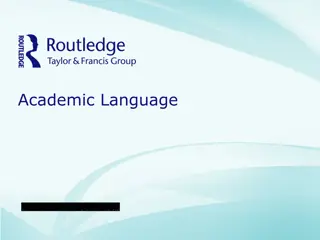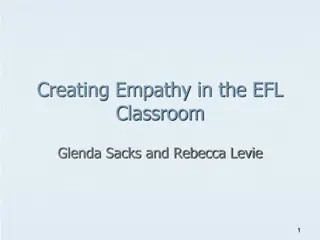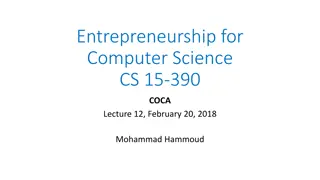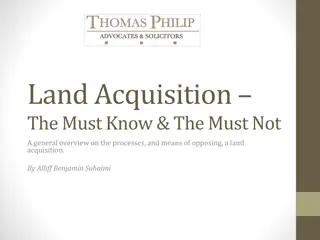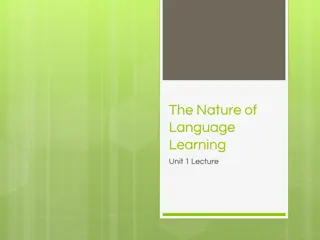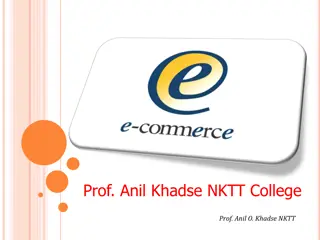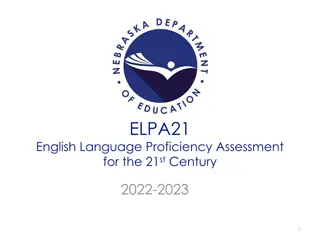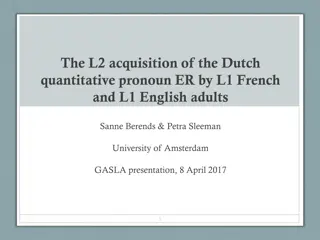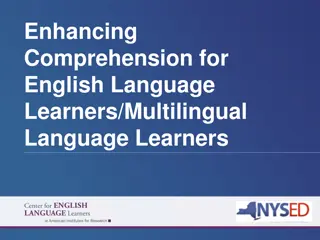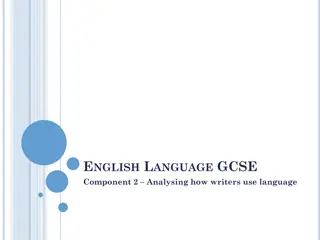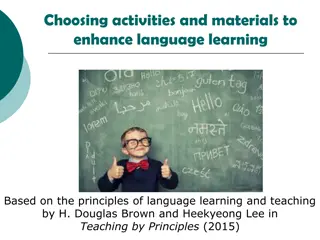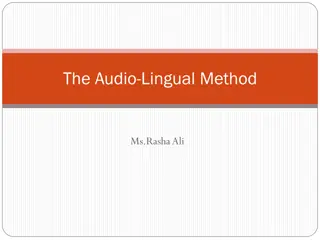Exploring the Ubiquity of English in Language Acquisition
This lesson plan aims to intensify motivation in learning English, develop speaking skills, and enhance cultural awareness among students. By exploring the ubiquity of English language, students will analyze data patterns, practice effective study habits, and understand the importance of language acquisition for communication in a global environment.
Download Presentation

Please find below an Image/Link to download the presentation.
The content on the website is provided AS IS for your information and personal use only. It may not be sold, licensed, or shared on other websites without obtaining consent from the author. Download presentation by click this link. If you encounter any issues during the download, it is possible that the publisher has removed the file from their server.
E N D
Presentation Transcript
Lesson Plan 3 Topic : Ubiquity of English Teacher : Nurmukhamedova D.T.
Aims of the lesson: Learning: - to intensify motivation of learning English and promote acquire speech; Spiritual- educational: -teach toanalyze and arrangespecific data into meaningful patterns; - to promotestudents cultural level; - to bring up students patriotic feelings; Developing: -to develop speaking skills through a wide range of speaking which necessitate giving information, exchanging and justifying opinions and ideas, comparing and contrasting, agreeing and disagreeing, suggesting and speculating; - toenlargestudents active language reserves; - todevelopability towork in teams. practical tasks
Lesson Plan 3 Ubiquity of English. Level: B 2 Time: 80 min Materials: Scale Up Aim: improve and explore the most effective study habits Skills to be practiced: The English language, foreign languages, learning a language, die out (dead) language, official language, knowledge, fluently, memorize, necessary, practice, communicate, all over the world, advice, exchange programme, correspondence, international exchange center.
Lets read the epigraph of our lesson. Those who know nothing of foreign languages, know nothing of their own . (J. Goethe )
Inevitable Ubiquity Language Construct Foreseeable Inveterate Acquisition Preferred Subsequently Convenient communication Environment
Inevitable Impossible to avoid or prevent Ubiquity The fact that something seems to be everywhere Language The method of human communication using spoken or written words Construct To build or make something Foreseeable As far in the future as you can imagine Inveterate Always doing a particular thing and unlikely to change Acquisition The process of getting something Preferred More suitable or useful than something else Subsequently After something else happened Convenient Easy for you to do or suitable for your needs communication The process of giving or exchanging information or of making emotions or ideas known to someone Environment The place in which people live and work, including all the physical conditions that affect them
Also try to use these words and expressions at the lesson The English language, foreign languages, learning a language, die out (dead) language, official language, knowledge, fluently, memorize, necessary, practice, communicate, all over the world, advice, exchange programme, correspondence, international exchange center.
Warm-up Activity 1: speaking Objectives: Brainstorm students opinion on video To catch students interest. Material: Scale up
Speaking activity 2 Why do we need English as a global? EDUCATION TRAVELLING MEDICAL RESEARCH INTERNET ENGLISH SCIENCE MASS MEDIA TRADE TO GET A JOB TO EARN MONEY
Listening activity 3 1. What makes communication easier? a) language learning b) words c) knowledge of English 2. What languages were offered as an alternative international language? a) Chinese, Russian b) Mandarin, French c) Esperanto 3. In what areas of Tashkent city English signs are less popular? a) Chorsu, Chopon ota b) Kukcha c) all areas 4. According to the speaker s opinion, what place can be good to enlarge one s vocabulary? a) City center b) Chopon ota street c) language centers
is inevitable; tonal nature; co n s t r u c t e d rationally; in the foreseeable future; much less so the case; to say nothing of; inveterate homemakers; Complete the sentences using the expressions from the box. Explain their meaning. 1. In order to make it neutral and easily absorbed Esperanto w a s___________________________ 2. It_______________ that English becomes a single international language. 3. A specific _______________ of the Chinese language hampers its spreading. 4. Popularity of French as a language of diplomacy and exchange is ____________________________ 5. English is unlikely to be replaced by any other language _________________________________ 6. Common words and expressions like open , close , enter , shop , happy are popular even among ___________________________________ 7. English words are popular enough in all cities and towns tourist centers.
Reading activity 4 6 Match the words in bold from the text and the phrases from 1-8. 1. to become thoroughly proficient in 2. make or compose from other materials or sources. 3. it can be argued that.... 4. to acquire (something desirable); obtain 5. to remove faults from; correct 6. to reduce to or estimate at the least possible degree or amount 7. to give legal force or official confirmation to; 8. another word for horrific
Read the text and answer the questions 1. Why is the equivalent of English I in Uzbek used less frequently? 2. What rules about prepositions in English is useful to know? 3. Why is English identified as American in Illinois law? 4. Why is QWERTY keyboard called this way? 5. How many words are there in the Oxford English Dictionary?
7 Read the statements and put them in the order. Listen and check. (__) English spoken all over the world differs from British or American (__) There are many versions of English in the world, which are not considered as dialects. ( __) Young Uzbek people frequently use words adopted from English. (__) We never take into consideration that there are some other versions of English besides British and American
Look at the pictures and identify the people on the photo. Make a list of some other English words known among particular groups of people Guess and write their study habits.
Writing activity 5 Match the labels in the box and the sentences 1-12 below. 1. Present Simple 2. Present Perfect 3. Present Perfect Continuous 4. Past Perfect Continuous 5. Past Simple 6. Present Continuous 7. Past Perfect 8. Future Simple 9. Future Perfect 10. Future with 'going to' 11. Future Continuous 12 .Past Continuous
1. Students are spending so much time on learning new words by heart.__________________________ 2. Sailors in the Mediterranean Sea used lingua franca for interaction.______________________ 3. They had researched the market carefully before they decided to open a new branch.____________ 4. Diamonds don t have much intrinsic value and their price mostly depends on their scarcity._____ 5. I think they will explain everything precisely._____ 6. Saodatwas reading her favorite Harry Potter when her brother interrupted._________________ 7. I have figured out 51 English words while coming to the university._____________________________ 8. The number of English speakers has been increasing recently.__________________________ 9. Consequently, Umar will be lying on the beach with his family next week.____________________ 10. We had been confusing things for two days when they finally illuminated the difference._________ 11. In my article I m going to run through some of the main points of the matter._____________________ 12. Experts will surely have finished their work by the end of the next month.
Read the descriptions a-k and decide which y -sentence in previous exercise they match. a. ____an action which is happening at the present moment. b. ____a finished past action which occurs at a specific moment in the past. c. ____ talking about an action that is finished before another action in the past. This form is especially useful for giving reasons for a decision that was made in the past. d. ____regular routines and habits. e. _____making a future prediction or express a decision about the future made at the moment. f _____ something that is happening at a precise moment in the past; an interrupted action. g. _____something which has happened up to the present moment. h. ____the duration of an activity that begins in the past and continues up to the present moment. i. _____discussing an activity that will be in progress at a specific point in future. j. _____ expressing the duration of an activity up to another point in the past; stressing that a certain activity had been going on before something important happened. k. _____ speaking about future intentions or plans made before the present moment.
Home task Write an essay on the topic English in my life
